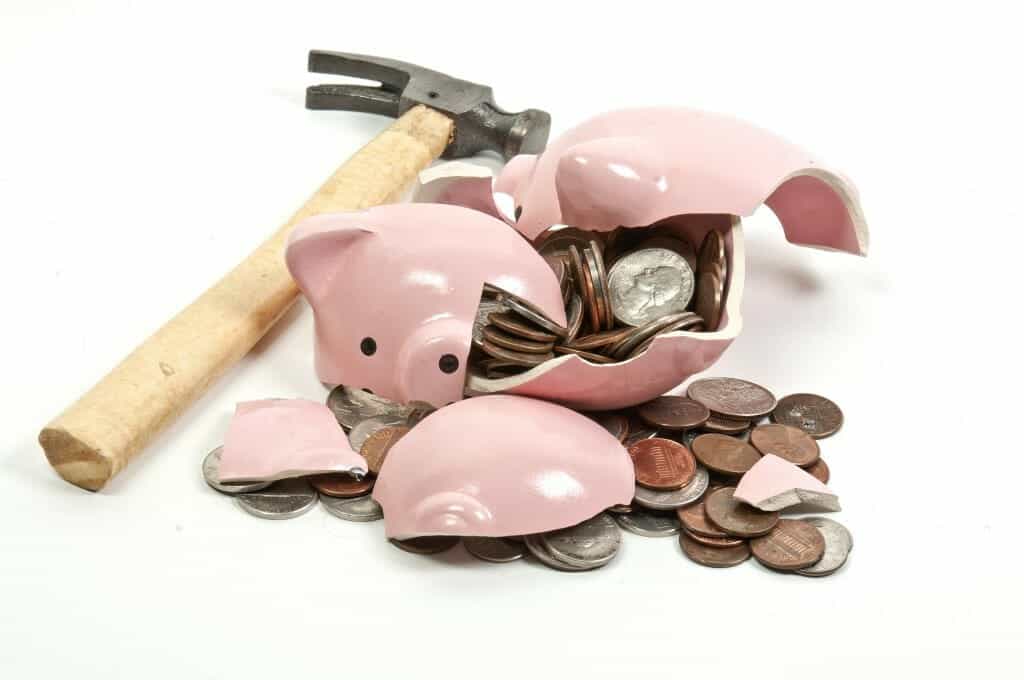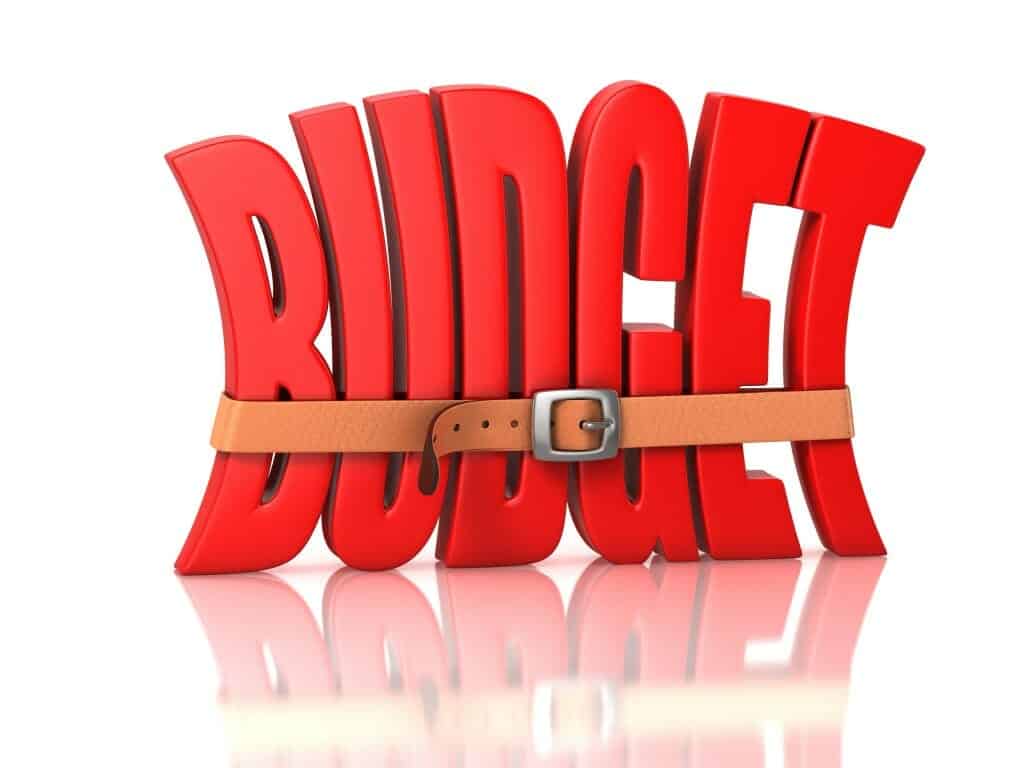
After going back and forth in your head for months (or years!) you FINALLY decided that you were going to get a divorce. Then the economy tanked. Or your spouse lost his/her job. Or the stock market took a nosedive. And suddenly you found yourself right back in the throes of indecision, wondering, “Can I even afford to get a divorce now?”
Back to square one.
Now what?
[amp-optin id=11936]
The One Question You Need to Ask
Just because the economy changed, or your personal economy changed, that doesn’t necessarily mean that you can’t afford to get a divorce.
But it does mean that before you move forward with your divorce you have to ask yourself one very important question. … and you need to be totally honest with yourself about the answer.
Q: How will I (and my kids) survive if I get a divorce?
While the question is simple enough, finding the answer can be more complicated than you may think.
Before you can answer that question you need to know three things:
- How much money (income and assets) will I have after my divorce?
- What will my debts and expenses be like after my divorce?
- How resourceful am I willing to be to get what I want and need?
Answering those three questions will let you know whether you can afford to get a divorce or not.

Figuring Out the Money Questions – Income and Assets
Before you can even think of getting a divorce, the first thing you need to figure out is how much money you will have coming in after your divorce.
Many people mistakenly believe that if they’re not the primary breadwinner in the family, they can’t afford to get a divorce because they can’t support themselves. When it comes to divorce, however, that’s not necessarily true.
Child support and spousal support (a/k/a maintenance or alimony) can all be used as sources of income after your divorce. While those sources of income aren’t permanent solutions to your income problem, they can at least bridge the gap to get you from where you are immediately after your divorce to where you want to be.
When trying to figure out your post-divorce “income” you should consider these 5 categories:
- Income you earn;
- Passive income from assets you own;
- Profits from a business you own;
- Child support; and
- Spousal support.
In order to figure out whether you will be able to support yourself if you get a divorce, you need to start by gathering information about income you will receive from all five of these sources.
Earned Income
Earned income is money you receive for work that you do. That includes your salary, bonus, commissions, tips, and any other money you earn for the services you perform.
Passive Income
Passive income is money that your assets generate without you having to do too much work. Things like rental income from properties you own, royalties from books or music you wrote, or films you acted in, are all examples of “passive income.”
(NOTE: Some “passive” income sources aren’t as “passive” as they sound. They still require you to DO something if you want them to generate money for you! For example, rental income sounds passive, until your tenant calls at 2:00am and tells you that you need to come over and fix a leaky toilet!)
Business Profits
Profits that your business makes is also income. This business profit is money that you earn over and above the salary that your business pays you.

Child Support
Child support is not technically “income.” It is money paid to you (or paid by you) to support your kids. It’s not taxable to the person who receives it. Yet, for purposes of determining how much money you will have coming in the door after your divorce, child support counts.
Most states have formulas that are used to calculate child support. While the most accurate way to calculate child support is to consult with an attorney in your area, you can also use an online child support calculator to give you a rough idea of what child support should be in your divorce.
Spousal Support
Spousal support is money that your ex pays to support you after your divorce (or vice versa). If you were divorced before December 31, 2018, those payments may be taxable income to the person who receives them and tax deductible to the person who pays them. From January 1, 2019, forward, spousal support, like child support, is NOT taxable to the person who receives it.
Figuring out how much money you may get in spousal support, however, can be tricky.
Only a few states (like Illinois) use formulas to calculate spousal support. Most states have a list of various factors that they consider to determine whether, and how much, spousal support will be paid in any given divorce case. That makes it extremely difficult to figure out how much money you will receive (or have to pay) in spousal support without talking to a good divorce attorney in your area. Yet, having this information is critical.
If you live in a state that doesn’t have a spousal support formula, it will be well worth your time to at least talk to a good divorce attorney in your area about whether spousal support would likely be granted in your divorce and, if so, how much money would be involved.
[amp-optin id=11936]
Assets
Your assets are everything you own of value. That includes physical assets like your house, your car(s), boat(s), motorcycle(s), expensive jewelry, collectible items, etc.
Money is also an asset. So money you have in your checking, savings, or money market accounts is an asset. Your retirement account, investment accounts, stocks, bonds, options, trust funds, and other monetary accounts are also assets.
Step number one in figuring out whether you will be able to afford to get a divorce (or not!) is to gather information regarding all of your assets, debts, income and expenses. Step number two is to estimate how much of those assets you will end up with after your divorce.
While that may seem like a daunting task, remember, at this stage all you’re trying to do is to ESTIMATE what you’ll have if you get a divorce. Trying to come up with an exact calculation at this stage will only frustrate you.
The value of your assets changes every day. Unexpected expenses can throw your debt calculations off. What’s more, it’s impossible to know – before you’ve even mentioned the word “divorce” to your spouse – how much it will cost you. That, too, will affect your bottom line at the end of your divorce.
At this stage, all you’re looking for is a rough idea of what you might end up with if you get divorced. That idea is going to be imperfect. Things WILL happen that you didn’t expect. Your calculation may end up being way off.
But what matters is that you have somewhere to start right now so that you can see the big picture.

Figuring Out the Money Question – Expenses and Liabilities (a/k/a Debts)
The other kind of financial information you need before you can start figuring out whether you can afford to get a divorce or not is your expense and debt situation.
Expenses
There are two different kinds of expenses: expenses for goods and services, and expenses to pay down debts that you owe.
Expenses for goods and services fall into several different categories:
- Mortgage/rent and utilities
- Food and drink
- Medical insurance and medical expenses
- Transportation/Gas/Car Insurance
- Clothing/grooming/personal care
- Entertainment/Vacations
- Kids’ expenses (School fees/lunches/extra-curricular activities)
- Misc.
Expenses ALSO include any amount that you may have to pay your spouse for spousal support and child support after your divorce. (Again, if you need help calculating your potential support obligation, check in with a good divorce lawyer in your area.)
Debts
Debts are the bigger amounts of money you owe. Debts include the total amount of your mortgage, credit card debt, medical bills, student loans, car loans, and any other big chunks of money you owe anyone for anything.
(NOTE: Some things – like a mortgage – are BOTH a debt and an expense. The total amount you owe your mortgage company for your home loan is a debt. The amount you pay the mortgage company each month is an expense.)
Making a Budget and Balance Sheet
Once you’ve collected your financial information, you need a quick and efficient way to analyze that information. The best way to do that are to create a budget and a balance sheet.
A budget is a written list of your income and expenses. A balance sheet is a written list of your assets and debts. When you’re facing a divorce, you’re going to need to create both.
For most people, making a budget is about as enjoyable as getting a root canal. That’s probably why most people don’t do it.
A Gallup poll in 2013 showed that only about 32% of Americans actually make a written budget. Even less people probably make a written balance sheet.
When you are going through a divorce, though, making a budget is NOT optional.
Unless you make a budget, you can’t accurately calculate whether you will be able to support yourself after your divorce. If you can’t find a way to support yourself, you can’t afford to get a divorce.
What’s more, most courts are going to require you to prepare some sort of a financial affidavit as part of your divorce. While different courts call that document different names, it essentially amounts to a budget and a balance sheet.
(NOTE: If you need help making a budget, a quick Google search of “how to make a budget” will get you about 1,400,000,000 results. What’s more, accounting software like Quicken, Quick Books, and Mint.com can make preparing a budget and balance sheet much less painful.)

If My Budget is Negative Can I Afford to Get a Divorce?
If your projected post-divorce budget shows that you won’t have enough money to pay your bills at the end of every month, you’ve got a problem. But that doesn’t necessarily mean that you can’t afford to get a divorce. What it means is that you may have to make some difficult choices.
For example, if your monthly shortfall isn’t too big, you may be able to fill your budget gap by cutting some expenses. A hole in your budget may also show you that you’re going to need to get a job that pays you more money. If you’re not working at all you may see that, if you want a divorce, you’re going to have to get a job.
While discovering that may not make you do the happy dance, it’s vital information. Once you know what your situation is like, you know what your choices are.
If your projected post-divorce budget shows a BIG gap at the end of every month, that, of course is a bigger problem. Again, that doesn’t mean you can’t afford a divorce. But it might mean that getting a divorce will be a bigger financial hardship. Or it might mean that you can’t start your divorce TODAY. But, with proper planning, you may be able to put yourself into a financial situation where divorce is a viable option in the future.
Either way, knowing your financial situation is a critical first step in figuring out what you can and can’t afford. Your second step is to ask yourself an even more important question.
[amp-optin id=11936]
How Resourceful Can I Be?
As important as your financial situation is, the biggest, and arguably the most important, part of figuring out whether you can afford to get divorced DOESN’T lie in your budget and balance sheet.
It lies within yourself.
It lies in deciding how badly you want to change your life and end your marriage. More importantly, it lies in deciding what you’re willing to do to achieve the outcome you desire.
Here’s the deal.
Finances matter. They matter a lot. If you’re struggling to provide food and shelter for yourself and your kids every day, you’re not going to have the time or energy to deal with a divorce too.
If you’re unemployed and swimming in debt, getting a divorce might not be your best option at the moment.
Most of all, if getting a divorce means that you and your kids will have no place to live and no money to live on, then getting a divorce is a bad idea right now.
That’s important information to know.
But just because you may not be able to afford a divorce RIGHT NOW, that doesn’t mean that you won’t be able to afford a divorce EVER.
It just means that you need to take some time to get yourself ready for what lies ahead.

The Most Important (and Overlooked) Factor in Deciding Anything
The most important factor in deciding anything – including whether to get a divorce — isn’t money. It’s you.
It’s your drive, your desire for a better life, and your resourcefulness at finding ways to create that life for yourself and your kids, that truly determine whether you can afford to get a divorce now or not.
Even if your current financial situation isn’t great, if you’re willing to change your lifestyle, cut your expenses, and get a better job (or get a job) you may be able to afford a divorce relatively soon.
Of course, that may mean that you have to make sacrifices that you’d rather not make. It may mean that you have to bite your tongue and check your temper so that you can get divorced more amicably and less expensively.
But when you KNOW what you want, and you’re willing to work to make it happen, you’ll do it.
Maybe you won’t be able to do it today.
Maybe you won’t be able to do it tomorrow.
But if you’re willing to make a plan and then be resourceful in the way you work to achieve that plan, you may be able to do it sooner than you think.
The bottom line is that your resourcefulness – your ability to find ways to overcome your difficulties no matter what they are – is ultimately what will determine whether you are ready for a divorce or not.
____________
[amp-optin id=11936]

